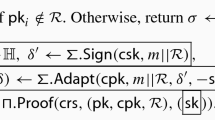Abstract
One of the important applications of digital signature is anonymous credential or pseudonym system. In these scenarios, it is essential that the identity of the signer is kept secret from any third party, except the trusted authority. The identity in such a system is uniquely identified by the secret key (or the signing key) rather than the public key, since the public key may be repeatedly randomized. This paper formalizes this notion by investigating a new property of digital signatures, called key indistinguishability. In this notion, given a number of digital signatures generated from two known public keys, an adversary cannot determine whether the signing keys used to generate these public keys, and hence the signatures, are the same. This property ensures that the signatures do not leak any information of the signing keys. Observing that existing digital signatures without random oracles do not provide such a property, we fill the gap with the first key indistinguishable signature scheme which is existentially unforgeable under a chosen message attack without using random oracles. The proposed scheme is also efficient and practical for applications in pseudonym systems.
Preview
Unable to display preview. Download preview PDF.
Similar content being viewed by others
References
Abadi, M., Rogaway, P.: Reconciling Two Views of Cryptography (The Computational Soundness of Formal Encryption). In: Watanabe, O., Hagiya, M., Ito, T., van Leeuwen, J., Mosses, P.D. (eds.) TCS 2000. LNCS, vol. 1872, pp. 3–22. Springer, Heidelberg (2000)
Ateniese, G., Camenisch, J., de Medeiros, B.: Untraceable RFID Tags via Insubvertible Encryption. In: Meadows, C. (ed.) ACM CCS 2005, pp. 92–101. ACM Press, New York (2005)
Ballard, L., Green, M., de Medeiros, B., Monrose, F.: Correlation-resistant Storage. Technical Report TR-SP-BGMM-050705, Johns Hopkins University (2005), http://spar.isi.jhu.edu/~mgreen/correlation.pdf
Bellare, M., Boldyreva, A., Desai, A., Pointcheval, D.: Key-privacy in public-key encryption. In: Boyd, C. (ed.) ASIACRYPT 2001. LNCS, vol. 2248, pp. 566–582. Springer, Heidelberg (2001)
Bellare, M., Rogaway, P.: Optimal Asymmetric Encryption-How to Encrypt with RSA. In: De Santis, A. (ed.) EUROCRYPT 1994. LNCS, vol. 950, pp. 92–111. Springer, Heidelberg (1995)
Boneh, D., Boyen, X.: Efficient Selective-ID Secure Identity-Based Encryption Without Random Oracles. In: Cachin, C., Camenisch, J.L. (eds.) EUROCRYPT 2004. LNCS, vol. 3027, pp. 223–238. Springer, Heidelberg (2004)
Boneh, D., Boyen, X.: Short Signatures Without Random Oracles. In: Cachin, C., Camenisch, J.L. (eds.) EUROCRYPT 2004. LNCS, vol. 3027, pp. 56–73. Springer, Heidelberg (2004)
Boneh, D., Lynn, B., Shacham, H.: Short Signatures from the Weil Pairing. In: Boyd, C. (ed.) ASIACRYPT 2001. LNCS, vol. 2248, pp. 514–532. Springer, Heidelberg (2001)
Brickell, E., Camenisch, J., Chen, L.: Direct Anonymous Attestation. In: Pfitzmann, B. (ed.) ACM CCS 2004, pp. 132–145. ACM Press, New York (2004)
Camenisch, J.L., Lysyanskaya, A.: Signature Schemes and Anonymous Credentials from Bilinear Maps. In: Franklin, M. (ed.) CRYPTO 2004. LNCS, vol. 3152, pp. 56–72. Springer, Heidelberg (2004)
Chaum, D., van Heyst, E.: Group signatures. In: Davies, D.W. (ed.) EUROCRYPT 1991. LNCS, vol. 547, pp. 257–265. Springer, Heidelberg (1991)
Cramer, R., Shoup, V.: A Practical Public Key Cryptosystem Provably Secure against Adaptive Chosen Ciphertext Attack. In: Krawczyk, H. (ed.) CRYPTO 1998. LNCS, vol. 1462, pp. 13–25. Springer, Heidelberg (1998)
Desai, A.: The Security of All-or-Nothing Encryption: Protecting against Exhaustive Key Search. In: Bellare, M. (ed.) CRYPTO 2000. LNCS, vol. 1880, pp. 359–375. Springer, Heidelberg (2000)
ElGamal, T.: A Public Key Cryptosystem and Signature Scheme Based on Discrete Logarithms. IEEE Transaction on Information Theory 31, 467–472 (1985)
Fischlin, M.: Pseudorandom Function Tribe Ensembles Based on One-Way Permutations: Improvements and Applications. In: Stern, J. (ed.) EUROCRYPT 1999. LNCS, vol. 1592, pp. 432–445. Springer, Heidelberg (1999)
Fischlin, M.: The Cramer-Shoup Strong-RSASignature Scheme Revisited. In: Desmedt, Y.G. (ed.) PKC 2003. LNCS, vol. 2567, pp. 116–129. Springer, Heidelberg (2002)
Galbraith, S.-D., Rotger, V.: Easy Decision Diffie-Hellman Groups. Journal of Computation and Mathematics 7, 201–218 (2004)
Gennaro, R., Halevi, S., Rabin, T.: Secure Hash-and-Sign Signatures without the Random Oracle. In: Stern, J. (ed.) EUROCRYPT 1999. LNCS, vol. 1592, pp. 123–139. Springer, Heidelberg (1999)
Goldwasser, S., Micali, S., Rivest, R.: A Digital Signature Scheme Secure against Adaptive Chosen-message Attacks. SIAM J. Computing 17(2), 281–308 (1988)
Halevi, S.: A Sufficient Condition for Key-privacy. Technique report (2005), http://eprint.iacr.org/
Lysyanskaya, A., Rivest, R.L., Sahai, A., Wolf, S.: Pseudonym Systems. In: Heys, H.M., Adams, C.M. (eds.) SAC 1999. LNCS, vol. 1758, pp. 184–199. Springer, Heidelberg (2000)
Miyaji, A., Nakabayashi, M., Takano, S.: New Explicit Conditions of Elliptic Curves for FR-reduction. IEICE Transactions on Fundamentals E84-A(5), 1234–1243 (2001)
Rivest, R.L., Shamir, A., Tauman, Y.: How to Leak a Secret. In: Boyd, C. (ed.) ASIACRYPT 2001. LNCS, vol. 2248, pp. 552–565. Springer, Heidelberg (2001)
Schnorr, C.-P.: Efficient Identification and Signatures for Smart Cards. In: Brassard, G. (ed.) CRYPTO 1989. LNCS, vol. 435, pp. 239–252. Springer, Heidelberg (1990)
Verheul, E.R.: Evidence that XTR Is More Secure than Supersingular Elliptic Curve Cryptosystems. In: Pfitzmann, B. (ed.) EUROCRYPT 2001. LNCS, vol. 2045, pp. 195–210. Springer, Heidelberg (2001)
Wu, Q., Qin, B., Mu, Y., Susilo, W.: Privacy for Private Key in Signatures. Full version (2009), http://eprint.iacr.org/
Yang, G., Wong, D., Deng, X., Wang, H.: Anonymous Signature Schemes. In: Yung, M., Dodis, Y., Kiayias, A., Malkin, T.G. (eds.) PKC 2006. LNCS, vol. 3958, pp. 347–363. Springer, Heidelberg (2006)
Author information
Authors and Affiliations
Editor information
Editors and Affiliations
Rights and permissions
Copyright information
© 2009 Springer-Verlag Berlin Heidelberg
About this paper
Cite this paper
Wu, Q., Qin, B., Mu, Y., Susilo, W. (2009). Privacy for Private Key in Signatures. In: Yung, M., Liu, P., Lin, D. (eds) Information Security and Cryptology. Inscrypt 2008. Lecture Notes in Computer Science, vol 5487. Springer, Berlin, Heidelberg. https://doi.org/10.1007/978-3-642-01440-6_9
Download citation
DOI: https://doi.org/10.1007/978-3-642-01440-6_9
Publisher Name: Springer, Berlin, Heidelberg
Print ISBN: 978-3-642-01439-0
Online ISBN: 978-3-642-01440-6
eBook Packages: Computer ScienceComputer Science (R0)




